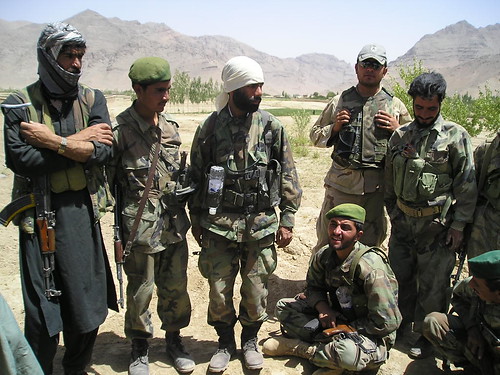So how does the Guerilla-CISO staff communicate with the locals on jaunts to foreign lands such as Deleware, New Jersey, and Afghanistan? The answer is simple, we use interpreters, known in infantrese as “terps”. Yes, you might not trust them deep down inside because they harbor all kinds of loyalties so complex that you can spend the rest of your life figuring out, but you can’t do the job without them.
But in remembering how we used our interpreters, I’m reminded of some basic concepts that might be transferable to the IT security and risk management world. Or maybe not, at least kick back and enjoy the storytelling while it’s free. =)
Know When to Treat Them Like Mushrooms: And by that, we mean “keep them in the dark and feed them bullsh*t”. What really mean is to tell potentially adversarial people that you’re working with the least amount of information that they need to do their job in order to limit the frequency and impact of them doing something nasty. When you’re planning a patrol, the worst way to ruin your week is to tell the terps when you’re leaving and where you’re going. That way, they can call their Taliban friends when you’re not looking and they’ll have a surprise waiting for you. No, it won’t be a birthday cake. The way I would get a terp is that one would be assigned to me by our battalion staff and the night before the patrol I would tell the specific terp that we were leaving in the morning, give them a time that I would come by to check up on them, and that they would need to bring enough gear for 5 days. Before they got into my vehicles and we rolled away, I would look through their gear to make sure they didn’t have any kind of communications device (radio or telephone) to let their buddies know where we were at.
Fudge the Schedule to Minimize Project Risk: Terps–even the good ones–are notorious for being on “local time”, which for a patrol means one hour later than you told them you were leaving. The good part about this is that it’s way better than true local time, which has a margin of error of a week and a half. In order to keep from being late, always tell the terps when you’ll need them an hour and a half before you really do, then check up on them every half hour or so. Out on patrol, I would cut that margin down to half an hour because they didn’t have all the typical distractions to make them late.
Talk Slowly, Avoid Complex Sentences: The first skill to learn when using terps is to say things that their understanding of English can handle. When they’re doing their job for you, simple sentences works best. I know I’m walking down the road of heresy, but this is where quantitative risk assessment done poorly doesn’t work for me because now I something that’s entirely too complex to interpret to the non-IT crowd. In fact, it probably is worse than no risk assessment at all because it comes accross as “consultantspeak” with no tangible link back to reality.
Put Your Resources Where the Greatest Risk Is: To a vehicle patrol out in the desert, most of the action happens at the front of the patrol. That’s where you need a terp. That way, the small stuff, such as asking a local farmer to move his goats and sheep out of the road so you can drive through, stays small–without a terp up front, a 2-minute conversation becomes 15 minutes of hassle as you first have to get the terp up to the front of the patrol then tell them what’s going on.
Pigs, Chicken, and Roadside Bombs: We all know the story about how in the eggs and bacon breakfast, the chicken is a participant but the pig is committed. Well, when I go on a patrol with a terp, I want them to be committed. That means riding in the front vehicle with me. It’s my “poison pill” defense in knowing that if my terp tipped off the Taliban and they blow up the lead vehicle with me in it, at least they would also get the terp. A little bit of risk-sharing in a venture goes a long way at getting honesty out of people.
Share Risk in a Culturally-Acceptable Way: Our terps would balk at the idea of riding in the front vehicle most of the time. I don’t blame them, it’s the vehicle most likely to be turned into 2 tons of slag metal thanks to pressure plates hooked up to IEDs. The typical American response is something along the lines of “It’s your country, you’re riding up front with me so if I get blown up, you do to”. Yes, I share that ideal, but the Afghanis don’t understand country loyalties, the only thing they understand is their tribe, their village, and their family. The Guerilla-CISO method here is to get down inside their heads by saying “Come ride with me, if we die, we die together like brothers”. You’re saying the same thing basically but you’re framing it in a cultural context that they can’t say no to.
Reward People Willing to Embrace Your Risks: One of the ways that I was effective in dealing with the terps was that I would check in occassionally to see if they were doing alright during down-time from missions. They would show me some Bollywood movies dubbed into Pashto, I would give them fatty American foods (Little Debbie FTW!). They would play their music. I would make fun of their music and amaze them because they never figured out how I knew that the song had drums, a stringed instrument, and somebody singing (hey, all their favorite songs have that). They would share their “foot bread” (the bread is stamped flat by people walking on it before it’s cooked, I was too scared to ask if they washed their feet first) with me. I would teach them how to say “Barbara (their assignment scheduler back on an airbase) was a <censored> for putting them out in the middle of nowhere on this assignment” and other savory phrases. These forays weren’t for my own enjoyment, but to build rapport with the terps so that they would understand when I would give them some risk management love, Guerilla-CISO style.

Police, Afghan Army and an Interpreter photo by ME!. The guy in the baseball cap and glasses is one of the best terps I ever worked with.
Similar Posts:
 1 Comment »
1 Comment » Posts RSS
Posts RSS



